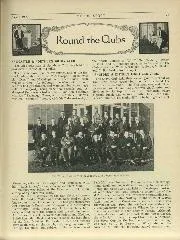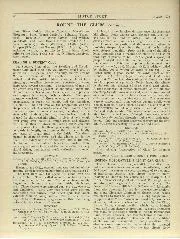

Round the Clubs, August 1925
NEWCASTLE & NORTHERN MOTOR CLUB. The All-Night Run of the above Club was held this year over a course of 164 miles. There were close upon thirty entries, and at…
Van Diemen made an immediate impact on the world of junior single-seaters just over 45 years ago. The fledgling constructor won the second edition of the Formula Ford Festival in 1973, but it was the arrival of an all-new design ahead of the 1977 season that set the Snetterton-based constructor on course for world domination in the FF1600 class and its successors.
Ralph Firman had set up the company in 1973 when he joined forces with Australian Ross Ambrose. The partnership (whose name tipped its hat to Ambrose’s native Tasmania) turned out to be short-lived, but their first creation had proved its worth at the Festival and orders followed.
Creation is probably the right word for the Van Diemen FA73 in which Don MacLeod won the Festival, then held at Snetterton. The Lotus 69-based machine was best termed a ‘workshop’ car: it was, Firman once said, “built rather than designed”.
The successes that followed with the RF74 — Firman dropped Ambrose’s initial from the type ‘number’ — waned as Van Diemen’s rivals introduced new designs. The firm’s response was an all-new contender designed ex-Lotus man by Dave Baldwin.
The RF77 was quick out of the box. MacLeod, who’d returned to the Van Diemen fold at the back end of 1976, might have won the Festival again, this time held for the first time at Brands Hatch. He won his heat, quarter-final and semi, before spinning while challenging eventual winner Derek Daly’s Hawke in the final. A first win followed a few weeks later, also at Brands and also with MacLeod at the wheel.
Future Formula 1 driver Chico Serra, one of the first in a long line of talented Brazilians who beat a path to Firman’s door, would win the British Racing & Sports Car Club’s Townsend Thoresen FF1600 title by just three points from MacLeod. The RF77 also claimed championship success in Sweden, Denmark and Germany and, just as importantly, won the ultra-competitive Brands-based one-circuit championship. The RF77 had put Van Diemen’s name back on the Formula Ford map.
“The car set the first under-50sec FF1600 lap of the Brands Indy Circuit”
The RF77 evolved into what may regard as its classic configuration for 1979. The radiator moved to the front and there were also revisions to the way the Kent engine in the back was mounted. The car set the first under-50sec FF1600 lap of the Brands Hatch Indy Circuit in the hands of James Weaver and won the TT title with Briton Terry Gray.
In the following season the RF80 dominated. Roberto Moreno, the latest Brazilian hotshoe for the works team, took the TT crown and put Van Diemen’s name back on the Festival trophy with a performance that included lowering the lap record to 49.4sec, a mark that would stand deep into the 1980s. Tommy Byrne won the RAC and P&O Ferries titles for Van Diemen, the former on a tie-break from works driver Raul Boesel.
The RF77 remained the basis of Van Diemen beyond 1980, even if the origin was increasingly unrecognisable. Inboard front suspension arrived for 1981 and with it bespoke uprights rather than the modified Triumph Herald units of its predecessors. Van Diemen gave the car a fresh look for 1983 with all-new bodywork. Only for 1984 did Baldwin start afresh with a clean slate.
A further five Festival victories would follow, and Van Diemen’s successes didn’t stop with the switch to the Zetec and Duratec engines. The foundation stone was the RF77 that went largely unchanged until 1980.
VAN DIEMEN RF77-80
• Price new N/A
• Price now £12,000-£30,000
• Engine 1600cc Ford eight-valve inline four-cylinder
• Power 110bhp
• Rivals Royale RP24 & RP26, Crosslé 32F/35F, PRS RH01/02
• Verdict The most successful FF1600 of its era, making Van Diemen the class’s benchmark constructor
A versatile single-seater with huge race potential
The Van Diemen RF78/79/80 would be an excellent entry point into the ownership of historic racing cars, and opens the door to a vast array of Formula Ford 1600 events, both in the UK and abroad.
You won’t be short of opportunities to use the car as pretty much each sector of the UK offers a local FF1600 championship – from Anglesey to Knockhill to Brands Hatch, and the adoption of the nationwide Classic FF1600 Championship by the HSCC will only boost the appeal of models like this. That should help to maintain demand and therefore prices.
Being primarily a club-racing car, most sales are private, so there’s not a historical list of auction sales. Cars can range from about £8000 for those needing attention (and an engine, usually), to closer to £30,000 for a prime example with good history.
The models are supported by specialist suppliers, and many spare components are still manufactured. The famous Ford Kent engine is also readily available, but can be costly.
Ayrton Senna’s first racing car was a Van Diemen RF81, and has recently been restored by marque founder Ralph Firman. There are no details of its price, or even if it’s up for sale soon, but expect it to cost a fair bit more than others.
Robert Johnson, Classic and Sports Finance
